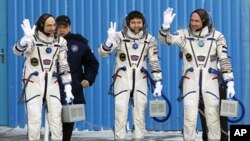Russia is the only country ferrying astronauts and cargo to the International Space Station and back since NASA retired its aging fleet. But Russia's space agency has experienced a string of mishaps in recent months. Some analysts are worrying about the reliability of the Russian space program.
The November launch of the Phobos-Grunt probe from the Baikonur Cosmodrome on the Kazakh steppe was meant to take Russia back to deep space after a decade-long absence.
To the embarrassment of Russia’s space agency, Roscosmos, the more than $163 million probe failed to leave earth orbit on its intended trajectory towards a moon of Mars, to retrieve soil samples. Instead, the satellite spiraled aimlessly out of control before its batteries ran out, crashing last month into the Pacific Ocean.
Some Russian experts originally blamed U.S. radar for interfering with the probe’s onboard computer system, causing it to crash.
Russian Vice Prime Minister Dmitry Rogozin brought up the theory, soon after the probe's failure. He said Russian space craft often fail during the part of the flight invisible to and uncontrolled by Russia’s space agency.
Speaking recently on state-run television, satellite communications executive Sergei Pekhterev said he does not believe the United States would intentionally try to damage Russian space craft.
He said in order to make a satellite go down under artificial conditions, very complex work needs to be done. "It is really hard to imagine that the United States has spent billions of dollars to hit Phobos-Grunt," Pekhterev said. He added that he doubts it would happen.
New Eurasia Foundation analyst Andrei Kortunov dismissed the accusations more directly.
"In every country you will find a couple of freaks who will tell you that it is the international conspiracy to make all the problems," said Kortunov. "If the United States was in a position to shoot down a Russian satellite they would not need a strategic-weapons program to develop. It is something that does not exist. Those who are thinking in these terms are crazies."
Earlier this week, Roscosmos blamed the Phobos-Grunt failure on heavily charged particles in near space. Agency chief Vladimir Popovkin, says the particles interfered with the probe's computer memory. Popovkin also said the initial investigation found foreign parts played a role in the satellite’s demise.
Analyst Kortunov said using outside parts is necessary.
"It is also clear that no country in the world can produce everything it needs," he said. "We have to rely on each other, we have to trust each other."
Other recent failures include last summer’s loss of a cargo vessel bound for the International Space Station. The cargo failed to leave earth orbit, crashing into Siberia.
Pekhterev told Russian TV the country's space agency does not have the financial support it used to and therefore mishaps keep occurring.
He says during Soviet times, there was more funding to support the country’s space program. "Now, there are no funds to support these expensive facilities that used to involve hundreds of scientists and crew," he added.
President Dmitry Medvedev has acknowledged Russia’s space program needs more funding and has promised an increase for the organization as part of his modernization effort. According to government figures, Roscosmos received more than $3 billion in 2011, nearly triple the amount it received in 2007.
But Roscosmos has revealed the next manned launch, using a Soyuz rocket, to the International Space Station has been delayed due to technical problems.
Kortunov, with the new Eurasia foundation, says Russia has experienced setbacks, but that should not be too worrisome.
"There were some issues, but this [Soyuz] is the most reliable vehicle designed by man," Kortunov said. "If you look at the number of launches compared to the track record of the shuttle."
Kortunov says the way to guarantee the best space program is for international cooperation. "We must make sure we work together," he stressed.




